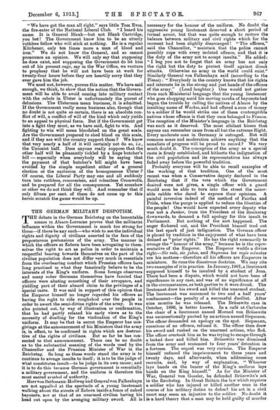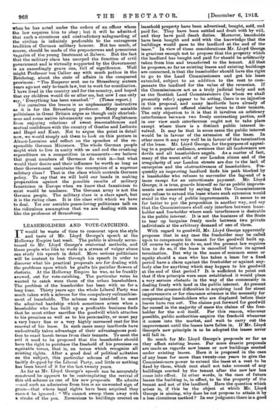THE GERMAN MILITARY DESPOTISM.
THE debate in the German Reichstag on the lamentable scenes in Alsace-Lorraine proves that the militarist influence within the Government is much too strong for those—if there be any such—who wish to see the individual rights and dignity of civilians asserted in the face of the preposterous pretensions of the army. The manner in which the officers at Zabern have been arrogating to them- selves the right to act as police in order to maintain a respectful bearing towards themselves on the part of the civilian population does not differ very much in essentials from the overbearing conduct which Prussian officers have long practised in what they fanatically believe to be the interests of the King's uniform. Some foreign observers and many sober Germans themselves have fancied that officers were abating something of their arrogance, and yielding part of their absurd claim to the privileges of a special caste. It was said in support of this opinion that the Emperor himself no longer regarded his officers as having the right to ride roughshod over the people in order to assert the semi-divine rights of the army. It was also pointed out, by way of illustration or confirmation, that he had partly relaxed his early views as to the necessity of duelling for the vindication of the King's uniform. It may be that in secret the Emperor has mis- givings at the announcement of his Ministers that the army is, in effect, to be confirmed in rights which are destruc- tive of the rights of civilians. But so far he has con- sented to that announcement. There can be no doubt as to the substantial meaning of the words used by the Chancellor and the Prussian Minister of War in the Reichstag. So long as these words stand the army is to continue to avenge insults to itself ; it is to be the judge of what constitutes insult—to be judge in its own cause ; and it is to do this because German government is essentially a military government, and the uniform is therefore the most sacred symbol of authority.
Herr von Bet htnann- Hollweg and General von Falkenbayn are not appalled at the spectacle of a young lieutenant walking about the streets of Zabern inside a fence of naked bayonets, nor at that of an unarmed civilian having his head cut open by the avenging military sword. All is
necessary for the honour of the uniform. No doubt the aggressive young lieutenant deserved a short period of formal arrest, but that was quite enough to restore the balance between military and civil rights which for the moment had been slightly disarranged ! "The officers," said the Chancellor, "maintain that the police cannot possibly cope with every isolated offence, and that it is the duty of the army not to accept insults." He added; "I beta you not to forget that an army has not only the right but the duty to protect itself against direct attacks. Otherwise no army in the world could exist." Similarly General von Falkeuhayn said (according to the Times): "Everybody in the country knows that his rights and interests lie in the strong and just hands of the officers of the army." (Loud laughter.) One would not gather from such Ministerial language that the young lieutenant who goes shopping amid his moving zareba of bayonets had begun the trouble by calling the natives of Alsace by the insulting name of Wcickes, and had offered a sum of money to a soldier if he would strike one of these contemptible natives whose offence is that they once belonged to France. The reception of the Minister's language in the Reichstag was such as it deserved. The most sibilant hisses that anyone can remember came from all but the extreme Right. Every moderate man in Germany is outraged. But will common sense and moderation achieve anything that the annalists of progress will be proud to record ? We very much doubt it. The conception of the army as a special caste is firmly established, and hitherto the indignation of the civil population and its representatives has always faded away before The powerful tradition.
Probably everyone will be able to recall examples of the working of that tradition. One of the most recent was when a Conservative deputy declared in the Reichstag that if the vote which the Government desired were not given, a single officer with a guard would soon be able to turn into the street the miser- able rabble who dared to express their opinions. A. painful inversion indeed of the method of Fairfax and Pride, when the purge is applied to reduce the liberties of the people! One would have expected every deputy who was not a Tunker, from the President of the _Reichstag downwards, to demand a full apology for this insult to Parliament. But nothing of the sort happened. The anger flickered out, and the President himself trod out the last spark of just indignation. The German officer is placed by tradition in the enjoyment of what have been defined as "prior rights." He has the right summarily to avenge the "honour of the army," because he is the repro- sentative of the Emperor. The Emperor wields a divine right—Sic volo, sic jubeo, and Suprema lex regis volurttas are his mottoes—therefore all his officers are Emperors in miniature. So runs the disastrous doctrine. We may cite two examples of it in practice. In January, 1901, a lieutenant supposed himself to be insulted by a student of Jena. There had been a dispute, which would not have been of significance in any case, and was of no significance at all in the circumstances, as both parties to it were drunk. The lieutenant drew his sword and killed the unarmed student. The lieutenant was sentenced to two and a half years' confinement—the penalty of a successful duellist. After nine months he was released. The Briisewitz case in October, 1896, is better known. In a cafe at Carlsruhe the chair of a lieutenant named Morned von Briisewitz was unintentionally pushed by an artisan named Siepmann. The officer demanded an apology on the spot. Siepuiann, conscious of no offence, refused it. The officer then drew his sword and rushed on the unarmed artisan, who fled. The officer overtook him as he was trying to escape through a locked door and killed him. Brirsewitz was dismissed from the army and sentenced to four years' detention in a fortress. The sequel was very curious. The Emperor himself reduced the imprisonment to three years and twenty days, and afterwards, when addressing some recruits, said, by way of explanation, " Whoever lays hands on the bearer of the King's uniform lays hands on the King himself." As for the Minister of War, General von Gossler, he defended Brfisewitz's act in the Reichstag. In Great Britain the law which requires a soldier who has injured or killed another man in the course of his military duties to defend his act in a civil court may seem an injustice to the soldier. No doubt it is a hard theory that a man may be held guilty of murder
When be has acted under the orders of an officer whom the law requires him to obey ; but it will be admitted that such a circuitous and contradictory -safeguarding of the civilian is infinitely preferable to the outrageous tradition of German military honour. Not too much, of course, should be made of the preposterous and precocious vagaries of the young lieutenant at Zabern. But the fact that the military class has usurped the function of civil government and is virtually supported by the Government is an exceedingly grave one, full of significance. Well might Professor van Calker say with much pathos in the Reichstag, about the state of affairs in the conquered provinces : "The Emperor sent me to Strassburg sixteen years ago not only to teach law, but to work for conciliation. I have lived in the country and for the country, and hoped that my children would do so after me, but now I can only say, ' Everything has been smashed.'" (Times report.)
For ourselves the lesson is as unpleasantly instructive as it is for the Strassburg professor. Many amiable politicians in Great Britain argue as though only churlish- ness and some native inhumanity can prevent Englishmen from enjoying relations of sweet reasonableness and mutual confidence with the country of Goethe and Leibnitz and Hegel and Kant. Not to argue the point in detail now, we would simply ask them to look on this picture in Alsace-Lorraine and reflect on the speeches of the re- sponsible German Ministers. The whole German people might wish to live in amity with us and end the crushing expenditure on a competition in armaments—we believe that great numbers of Germans do wish it—but what would their desire and their influence be worth so long as their Government maintains the conception of a supreme military class? That is the class which controls German policy. To say that we will hold our hands in making preparation against the possible results of military fanaticism in Europe when we know that fanaticism to exist would be madness. The German army is not the German people. The military class is a class apart, but it is the ruling class. It is the class with which we have to deal. Yet our amiable peace-loving politicians talk on the ridiculous assumption that we are dealing with men like the professor of Strassburg.



































































 Previous page
Previous page